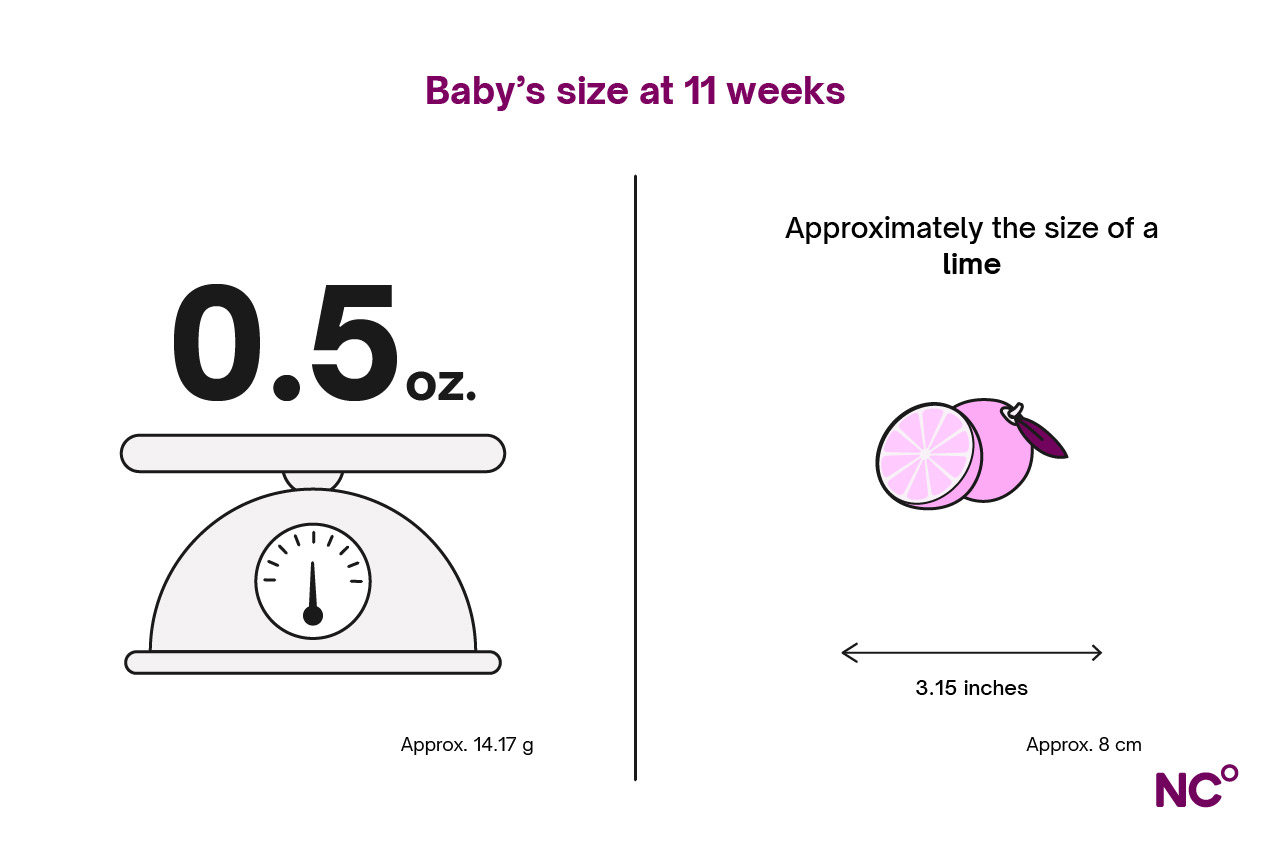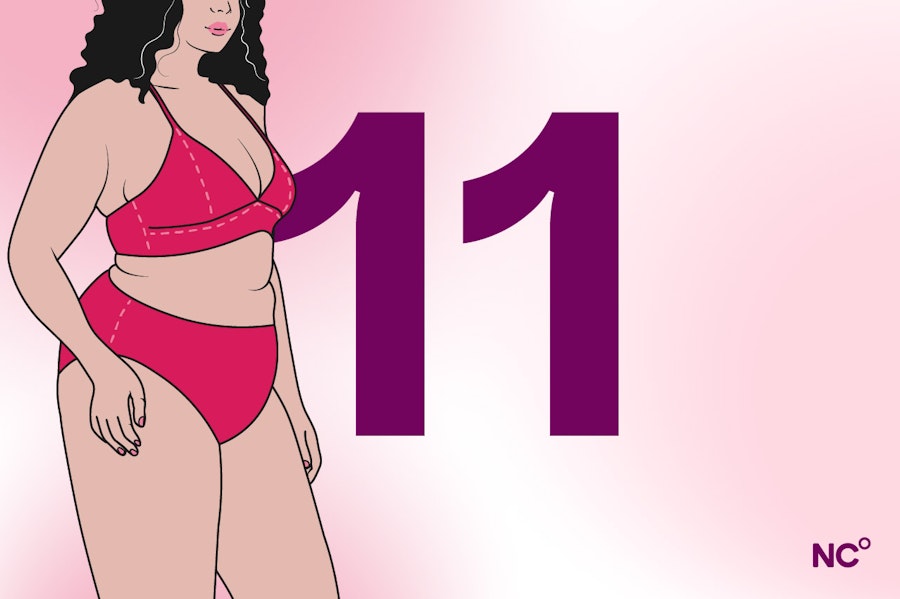11 Weeks pregnant: Pregnancy symptoms & tips
Follows NC° Editorial Policy
At Natural Cycles, our mission is to empower you with the knowledge you need to take charge of your health. At Cycle Matters, we create fact-checked, expert-written content that tackles these topics in a compassionate and accessible way. Read more...
Key takeaways
- You’re approaching the end of your first trimester, and symptoms such as morning sickness and fatigue may start to reduce
- You may experience bloating and gas, dizziness, sore muscles, and an increase in vaginal discharge
- Your baby’s fingers and toes are starting to separate, and the development of their different reproductive systems is underway
- Keep prioritising nutrition, gentle exercise, and rest, to ease uncomfortable pregnancy symptoms and support healthy baby development.
At 11 weeks pregnant, you may be counting down to the end of your first trimester! You may still be experiencing early pregnancy symptoms, such as morning sickness and tiredness, but these will likely reduce as you approach this milestone and hormonal changes settle. This article will discuss some of the symptoms you may be experiencing, your baby’s development, and tips for you this week.
Pregnancy symptoms at week 11
Bloating, gas and constipation
If you find yourself feeling bloated, gassy, or constipated, you can thank pregnancy's hormonal changes. The increase in progesterone in pregnancy can lead to slower digestion, which in turn can cause these uncomfortable symptoms [1]. Drinking plenty of water, eating plenty of fibre, and taking part in gentle exercise can help ease some of your discomfort and contribute to healthy bowel movements [2].
High emotions
So far, your baby has been fed by a yolk sac. Now, it is time for the placenta to take charge, feeding your baby and getting rid of waste for the remainder of your pregnancy. The hormones involved in this changeover can sometimes cause tiredness and strong emotions [3]. Be extra kind to yourself this week, prioritise rest, and try calming activities to reduce stress and anxiety, such as meditation, yoga, or walking. The good news is that your hormones should begin to settle as you enter your second trimester, and many will experience an increase in energy [3].
Sore muscles
As your baby grows, your uterus expands, and the muscles and ligaments around your stomach stretch to accommodate this. Sometimes this adjustment can cause mild muscular pain in your stomach, hips, and groin [4]. Gentle stretching, warm baths, and rest can help ease the discomfort. Be sure to speak to your healthcare provider if you experience severe, increasing, or consistent pain.
Vaginal discharge
As you progress through your pregnancy, you may notice an increase in vaginal discharge. This is called leucorrhoea and is caused by the increase in oestrogen and progesterone in the body. Discharge should be clear or white, similar to your normal discharge, and shouldn’t smell strongly. If you notice your discharge is different in colour, contains blood, smells bad, changes in texture, or is accompanied by itching or pain, speak to your healthcare provider. Changes to discharge can be an indication of an infection, so it’s important to address it early in your pregnancy [5].
Dizziness
During pregnancy, your body is pumping up to 50% more blood than usual [3]. This is an essential adaptation to nourish your uterus and your growing baby inside, but it can have uncomfortable side effects, including feeling dizzy, lightheaded, and hot. To ease symptoms, drink plenty of water throughout the day, use fans and cold compresses to cool down, and take plenty of time to rest.
Your baby’s development at Week 11
At week 11, your baby weighs around 0.5 ounces (14.17g) and its size is approximately 3.15 inches (8cm) — that’s about the size of a lime! [13]

Fingers and toes are separating
Your baby’s fingers and toes are beginning to lose their webbing and separate into individual digits [6].
Nail beds are forming
As the fingers and toes separate, nail beds begin to form [7], ready to soon begin growing fingernails and toenails.
Ovaries start forming
While you won’t be able to find out the sex of your baby yet, they are already developing their genitalia. If your baby is male, they will have begun to produce testosterone and develop their genitalia already. If your baby is female, their ovaries are starting to develop this week. [8]
Organs are well-developed
By week 11, the fetus’s heart is now fully formed and beating [6]. Their liver is beginning to produce red blood cells, and their head now accounts for around half of their overall size [9]. Don’t worry, their body size will catch up soon.
Tips for you at Week 11 of pregnancy
Eat nutritious meals
Nutrition is key to both battling uncomfortable digestive symptoms and supporting the healthy development of your baby. Try to eat a varied diet, including fruits, vegetables, wholegrains, lean protein, and healthy fats. Folic acid, vitamin D, and calcium are particularly important nutrients for healthy fetal development [10]. We recommend speaking with a healthcare provider before starting any new prenatal supplements.
Book your midwife appointment
You will likely have had your first midwife appointment (named the booking appointment) before you reach 11 weeks pregnant. If you have not booked this yet, contact your healthcare provider as soon as possible to book. After this, your second appointment — the dating scan — often occurs between weeks 8 and 14, depending on your location [14]. This will be your first look at your baby via ultrasound. At the appointment, the midwife will use the ultrasound to estimate your due date and check on your baby’s development. This can be both an exciting and anxious time for expecting parents. Be sure to speak to your midwife or doctor about any concerns you may have.
Think about how you’ll share your news
There is no “correct” time to announce your pregnancy, but many expecting parents wait until after their dating scan to announce their news to friends and family. Whether you decide to tell people earlier or later is entirely up to you, and there’s no right or wrong way to break the news.
Document your bump growth
Near the end of the first trimester, you might notice you are starting to “show” your pregnancy. This could be a perfect time to start documenting the growth of your bump! It can be a comforting countdown to your due date, and a lovely document of your pregnancy journey to look back on in the future. If you are not showing yet, there is no reason to worry — everyone starts showing at different times, and often not until they are in the second trimester. [6]
Book antenatal classes
Antenatal classes are designed to help support you during pregnancy and birth. They provide information on keeping healthy during pregnancy, how to make a birth plan, and looking after your newborn. They are also a great way to meet other expecting parents. Whilst you likely won’t start the classes until later in your pregnancy, it can be a good idea to research what classes are available near you, especially as some book up quickly [11].
Take part in gentle exercise
Exercise not only helps reduce bloating and constipation by aiding digestion, but also promotes cardiovascular health and good circulation. It is recommended that you undertake 150 minutes of exercise per week during pregnancy [3]. There are plenty of exercises suitable for pregnancy. Walking is a free and accessible form of exercise, with the added mental health benefit of time outdoors in nature. Swimming is a gentle and low-impact exercise, and modified yoga can help ease muscular pains and lower stress. If this sounds daunting, remember that any movement is better than no movement, and it is important that you feel comfortable with the exercise you are doing.
Shop for maternity clothes
Now that you are approaching the second trimester, your clothes may begin to feel less comfortable as your belly grows. If this is the case, you might want to start looking into maternity clothes, especially those that can accommodate your growing stomach throughout your pregnancy. You may feel pressure to buy brand new clothes, but there are plenty of other options, such as borrowing or sourcing second-hand. There are also lots of tips to extend the life of your existing clothing. Use a hair elastic around the button hole of your jeans to expand your waistband and increase comfort. You could also opt for loose clothing, like swing dresses or oversized shirts.
Following your pregnancy with Natural Cycles
As you reach the end of your first trimester and look forward to the second, NC° Follow Pregnancy can help you follow your baby’s development, track symptoms, and gain insights into your body’s mental, physical, and emotional changes. Once you have given birth, you can seamlessly switch to NC° Postpartum to support your recovery, too.
Did you enjoy reading this article?
